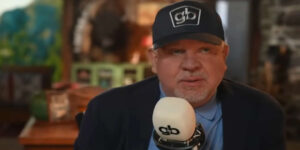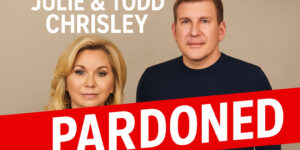Did ‘Bible Answer Man’ Hank Hanegraaff Abandon the Christian Faith?
For conservative and evangelical Christians, Hank Hanegraaff has long been a go-to guy for help in untangling a thorny Bible text or theological conundrum, says Mark Rumsey, WFAE 90.7, Charlotte, North Carolina’s NPR News Source, reporting on the conversion of the “Bible Answer Man” radio host from evangelical Protestantism to the Greek Orthodox Church.
The radio station says Hanegraaff has tackled listeners’ questions for nearly three decades as host of the nationally-syndicated “Bible Answer Man” radio show, broadcast since 2004 from the headquarters of the Christian Research Institute in Charlotte’s Blakeney area.
Lately, though, Hanegraaff has been fielding questions of a more personal nature. That’s because on Sunday, April 9, he officially became an ex-Protestant, according to the media outlet.
Hanegraaff stunned many supporters by joining St. Nektarios Greek Orthodox Church in south Charlotte.
“April 10th I came into the office, and there were news agencies from all around the world that wanted to talk to me. A picture had gone out over the internet. There were postings that said Hank Hanegraaff had walked away from the Christian faith—the fallout was dramatic,” said Hanegraaff.
Less than two weeks later, two conservative Christian radio networks had pulled the plug on the “Bible Answer Man” broadcast on nearly 120 stations. That left Hanegraaff’s show on 60 stations.
“We have a specific point of view that we represent, and we try to make that as close to a biblical worldview—a literal interpretation of the Bible,” says Michael Carbone, chief operating officer for the Winston-Salem-based Truth Network. “The Eastern Orthodox faith has some positions that are antithetical to a traditional evangelical biblical position.”
Hank Hanegraaff was born in the Netherlands and raised in the reformed Protestant tradition. After his family emigrated to the U.S., Hanegraaff says he “walked away” from Christianity during his teens and 20s. When he did return to church, he eventually settled into the evangelical Protestant community.
Recently, though, Hanegraaff became increasingly uncomfortable with some of what he saw there, including what he calls a “pastor-preneur” style of leadership.
“Where the pastor is like an entrepreneur, branding, formulaically getting people into seats—that became troubling to me, and I decided I was going to explore,” he said.
Hanegraaff had witnessed Eastern Orthodox Christianity as he traveled to other countries. Then, one day he Googled it and found a Greek Orthodox church nearby.
“I thought, you know, I’m going to experiment for a few weeks. Well, the few weeks has turned into being chrismated” (the rite of joining the Greek Orthodox Church).
Now, at St. Nektarios and in the ancient Eastern Orthodox tradition, Hanegraaff said he has found a spiritual home. Among the attractions for him: Orthodox beliefs about the Eucharist, or, Communion, and union with God. Hanegraaff is also drawn to what he calls the “spiritual gymnasium” of the Eastern Church where repetition, liturgy and ascetic practices like fasting are emphasized.
As one thoroughly-steeped in the Protestant faith, Hanegraaff readily acknowledged that for many people who first encounter an Eastern Orthodox service, the experience is baffling.
“You open those cathedral doors and, suddenly, the smell of incense, you hear the bells, you see the icons—and it’s all foreign to you, so you need some contextualization; and I think for most Protestants, they do not have that, and therefore sometimes they fear the worst,” said Hanegraaff.
He maintains that his theology “by and large” hasn’t changed.
“I stand shoulder-to-shoulder with evangelicals, with Roman Catholics, with Orthodoxy around the essentials of the Christian faith—meaning the main and plain things.”
Hanegraaff was asked where does his departure from Protestantism and all those dropped radio stations leave the future direction of his ministry?
“That’s not of concern to me,” said Hanegraaff. “I’ve seen over the years that God closes one door, and He opens other doors. For example, we’re now on the Orthodox Christian Network. For me this is not a popularity contest or the size of the platform; it is simply doing what God leads me to do. Let the chips fall where they may.”
Together with his recent spiritual transition, Hanegraaff has also found himself on another journey. He’s undergoing treatment for the blood cancer known as mantle cell lymphoma, a diagnosis he received soon after he formally marked his move to Eastern Orthodoxy. In the face of that illness, Hanegraaff said, his immersion in the Orthodox faith has been energizing.
“I probably shouldn’t even be able to do this interview right now, but I have been working full days, and I attribute that to some degree to the miracle of the Eucharist.”
Stoyan Zaimov, a reporter writing for The Christian Post, also reports that Bible Answer Man Hank Hanegraaff said watching pastors who act more like entrepreneurs focused on branding is part of the reason why he decided to leave evangelicalism and join an Eastern Orthodox Church.
The Christian Post states Hanegraaff told NPR’s Charlotte affiliate WFAE in an interview broadcast Wednesday that people jumped to the wrong conclusions following his decision to join the St. Nektarios Greek Orthodox Church in south Charlotte back in April, with some even suggesting that he had “walked away from the Christian faith.”
The Christian Research Institute president said that is not the case at all.
The Winston-Salem-based Truth Network and Bott Radio Network both pulled his radio broadcast from their stations following his conversion, as the controversy unfolded.
“We want to make sure that our listeners know that the programming that we have on Bott Radio Network is thoroughly biblical,” said BRN President Richard P. Bott II back in April.
Cindee Martin Morgan, daughter of Walter Martin, who in 1960 founded CRI as a conservative Protestant counterculture apologetics ministry, pushed back against Hanegraaff’s critics in a statement to The Christian Post in May.
“Given the fact that the Eastern Orthodox Church is very similar in ways to the Catholic Church—and holds to the essential core doctrine of Christianity—I believe Dr. Martin would view this church the same way,” Morgan told The Christian Post. “He would never declare that someone had ‘left the faith,’ in either of these churches, if the person professed faith in Jesus Christ demonstrated by the fruit of their life.”
Morgan also suggested that instead of people jumping to conclusions, they should be “praying, speaking the truth in love with humility and openly acknowledging that by the grace and mercy of God do any of us have access to salvation.” {eoa}
This article originally appeared on Assist News Service.






































